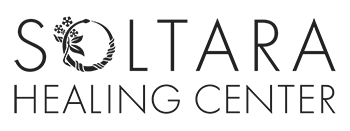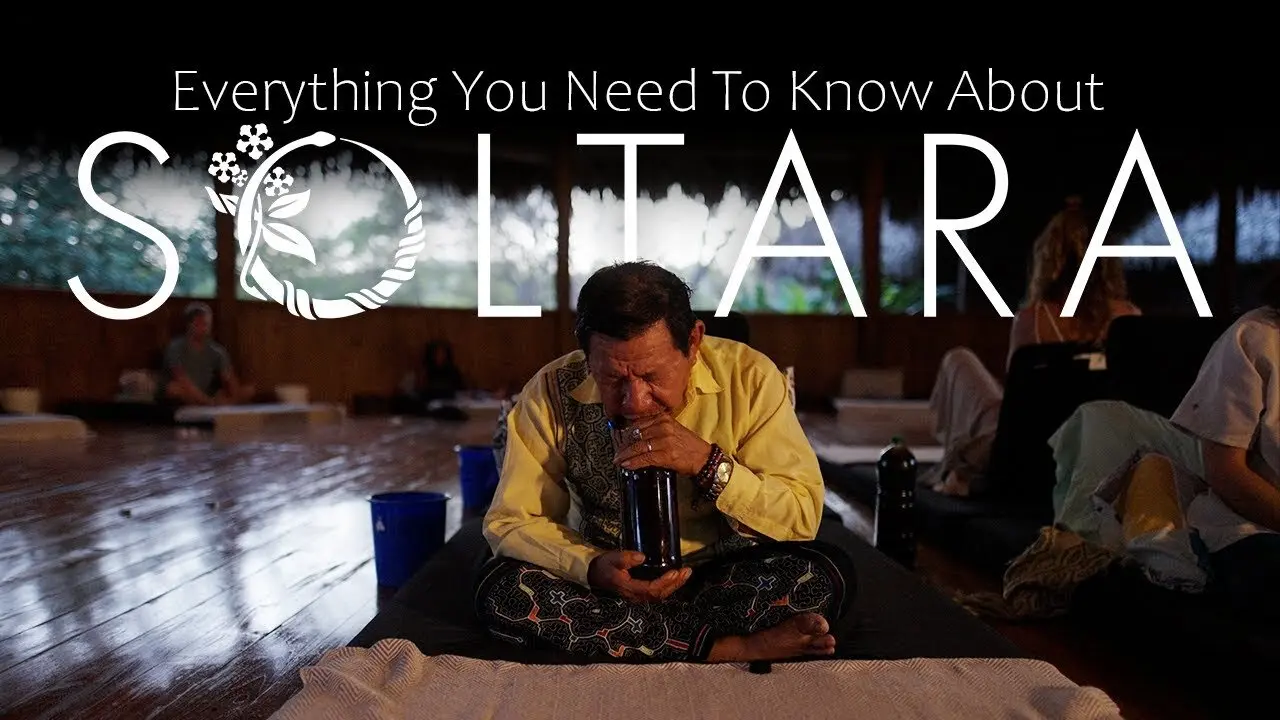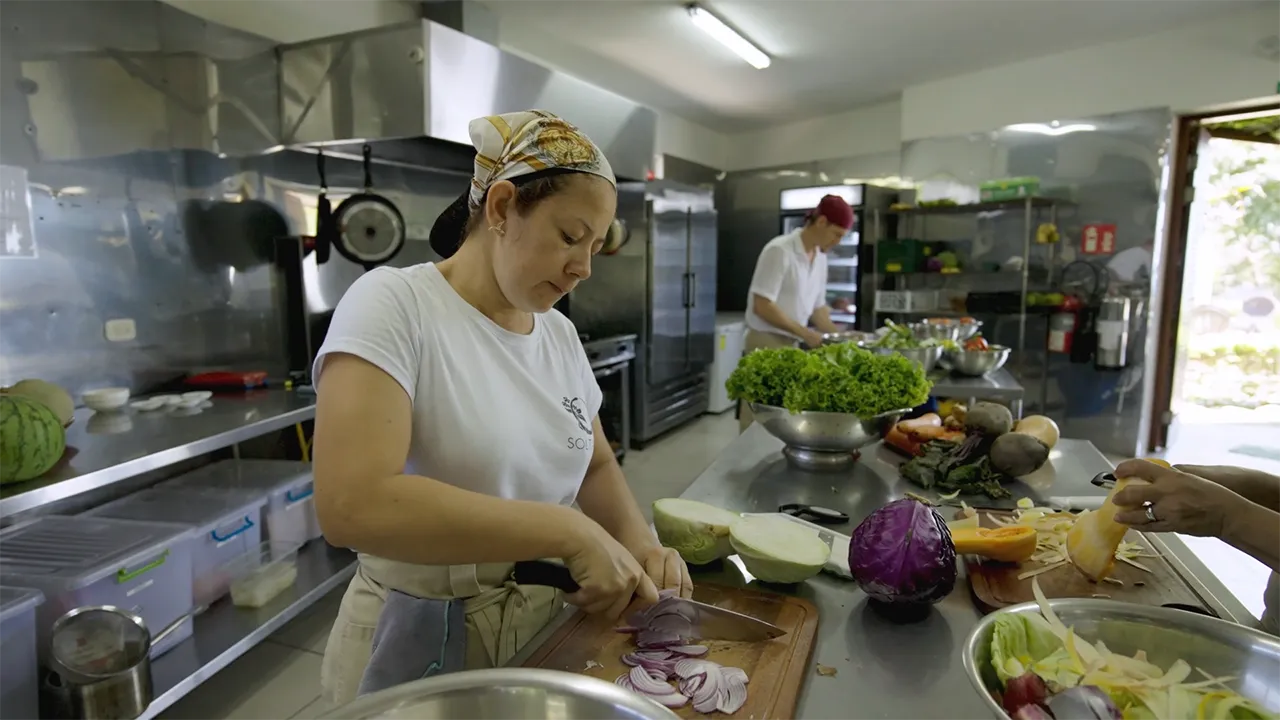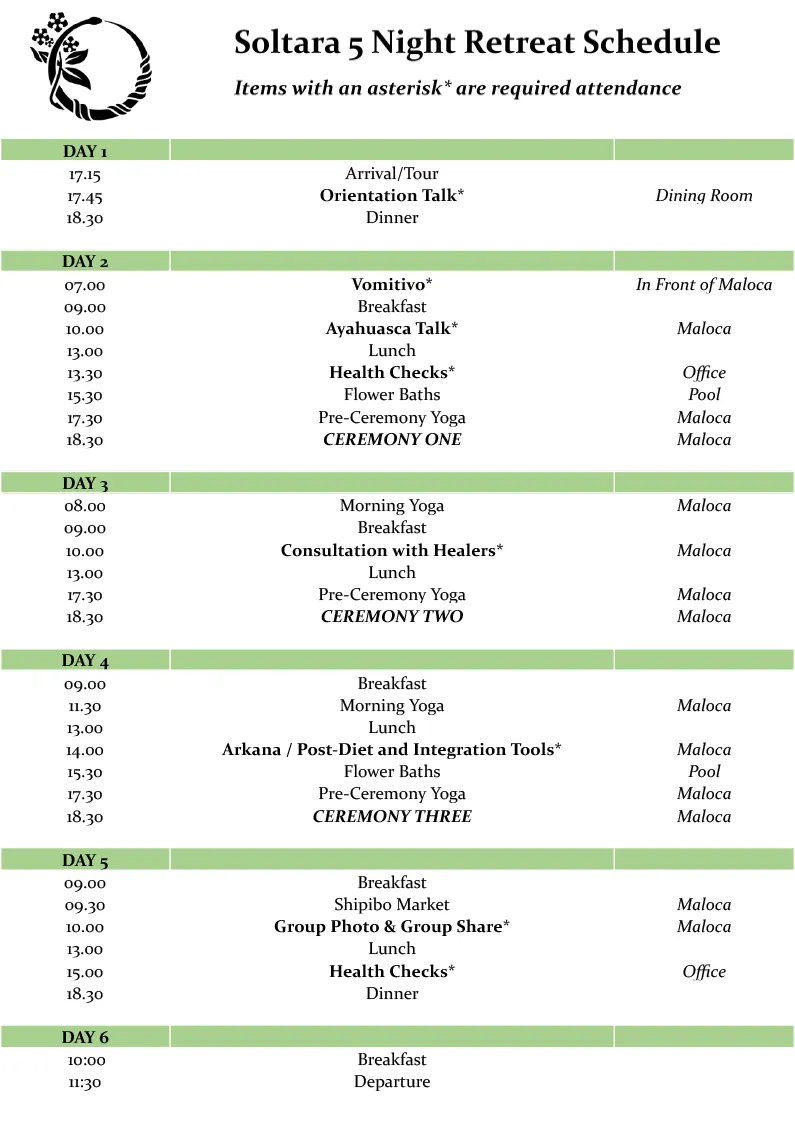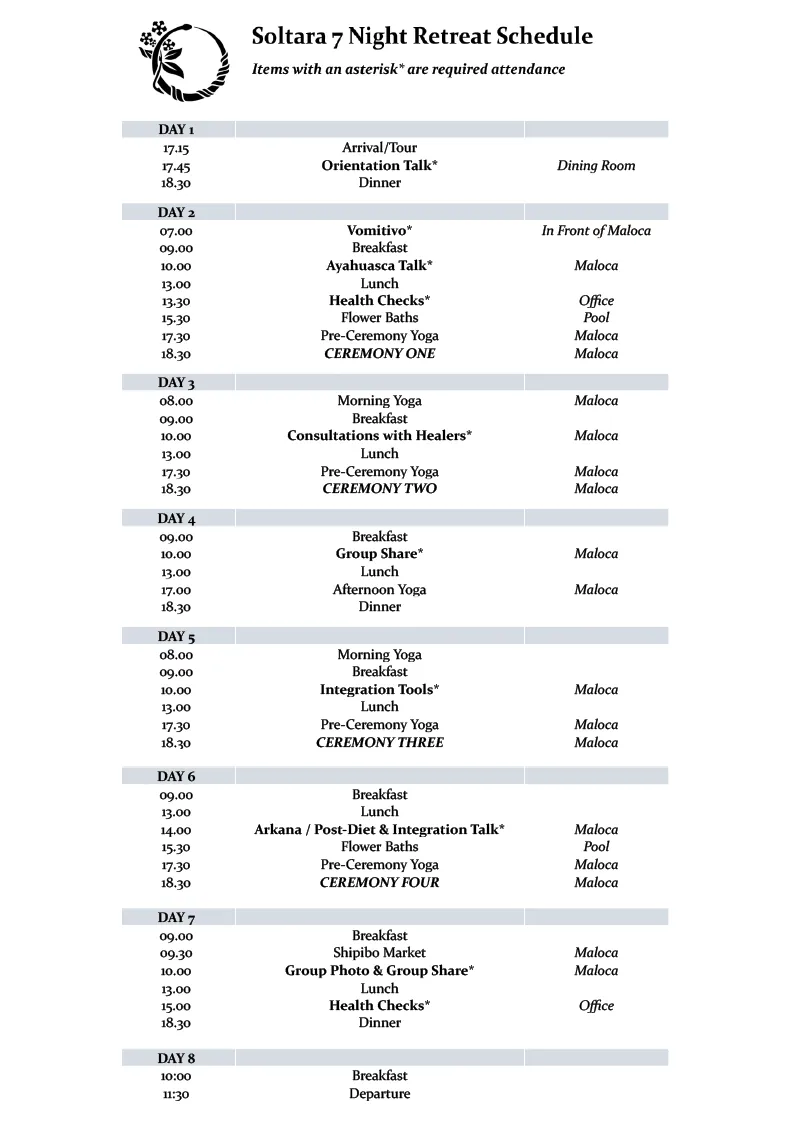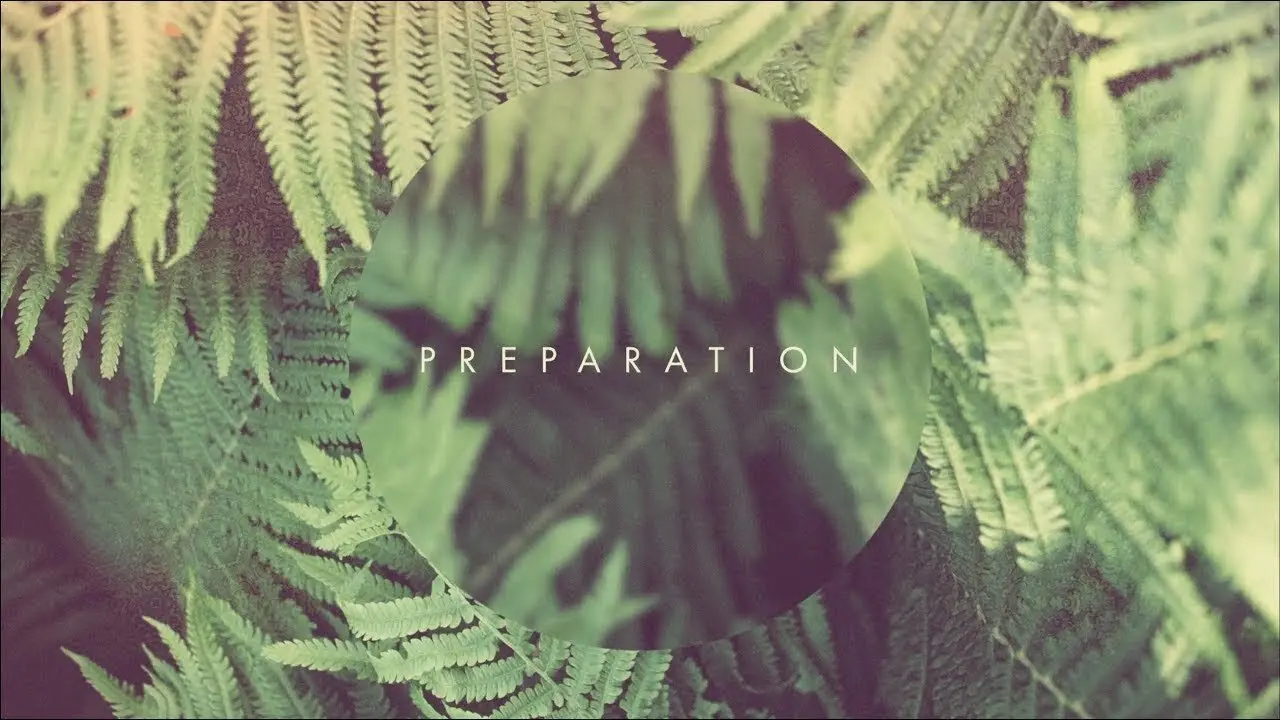While many healing modalities offered at Soltara can be learned and experienced for the first time without prior knowledge, working with plant medicines in sacred ceremony requires proper preparation and understanding, both for your safety and to have a fulfilling healing experience.
Please note that it is important to discuss with your doctor and let us know any medications you are taking upon registration to ensure your complete safety and well-being.
Comprehensive Preparation Support: Your Journey Begins Now
At Soltara, we believe that preparation is key to a transformative retreat experience. With our programs, you’re not just experiencing a retreat; you’re embarking on a full year of guided personal growth. Our support begins the moment you say ‘yes’ and extends far beyond your time in Costa Rica. Here’s how we guide and support you every step of the way:
Soltara Community Platform
Upon confirmation, you gain access to our comprehensive online platform, offering:
- Travel logistics and retreat information
- Community spaces for questions, sharing, and connecting
- Holistic resources covering physical, emotional, therapeutic, mental, spiritual, cultural, relational, creative, and travel support
- Regular monthly events, including free preparation circles with a Soltara therapist
- Guided experiences such as yoga, breathwork, and meditations
- Online courses for deeper exploration into topics, including the physiology of trauma, mindfulness, and ceremonial preparation
- Access to a vetted network of practitioners, coaches, and guides for individual support
- Curated educational content
- Latest Soltara news and retreat information
Thorough Intake Process
- Collaborative assessment with therapists and medical advisors
- Ensures a safe and supportive retreat tailored to your needs
Preparation Resources
- Ayahuasca diet guidebook to prepare your body for the retreat
- Entwined: Community Alignment program – A 12-module course supporting loved ones of those entering plant medicine ceremony
Expert-Led Sessions
- Group and 1-on-1 sessions with highly-qualified guides
- Diverse expertise including plant medicine therapists, somatic experience practitioners, Shipibo-informed support, applied neurology, and compassionate inquiry
Extended Support
- A full year of Soltara Plus Membership included with your retreat
- Continued access to all platform resources for integration and ongoing growth
Summary of Soltara’s Dietary and Medication Requirements
This section is organized to help you understand the range of physical activities and practices that can be helpful prior to and during your time at Soltara. Some of these are Strongly Recommended or Must Do activities (such as observing the dieta before your plant medicine experiences) and others are encouraged to enhance your experiences, or to help you through your ayahuasca journeys.
At Soltara, we hold a high standard for every aspect of the healing process. We believe all those who feel the call of the medicine, regardless of where they choose to partake, should understand the potential risks involved as well as the current knowledge, traditions, and recommendations, both spiritual and medical, in preparing for such an experience. That’s why we decided to sit down with a true expert, Dr. Clancy Cavnar, a prominent figure in the world of ayahuasca shamanism, and who has been working with the medicine for over 20 years, to put together the best tips and practices for you to get the most out of your experience.
Dietary, Energetic, & Medical Guidelines
While many healing modalities offered at Soltara can be learned and experienced without prior knowledge, working with plant medicines in sacred ceremony requires preparation and understanding, both for your safety and in order to have a fulfilling healing experience.
Ultimately, the goal of your preparation is to help you potentiate your experience with the medicine work. You’ve invested your time, energy, resources, and commitment to your healing, and we encourage you to see your preparation work less as a set of limitations and more as an investment in yourself and in devotion to the plants and the Shipibo tradition that stewards this work. Remember to be gentle with yourself, and whatever you do, do it with love.
Medical Overview
During your intake process, you will review any and all medications (including over-the-counter) and supplements (herbal & vitamin) with our intake support team, who will be able to help you understand if there are any medical or psychological contraindications with ayahuasca. We always recommend consulting with your doctor if you have any medical diagnoses, and to receive their guidance for any tapering schedules. We do not recommend changing or discontinuing use of medications or medically necessary supplements without consulting with your primary care doctor first.
Some medications & supplements are contraindicated with ayahuasca medicine. Interaction with pharmaceutical drugs, supplements, and medications (including some over-the-counter drugs and certain herbs) can be potentially life-threatening. Others are recommended to discontinue because they interfere with the ability of the healers to observe one’s energy field & clearly address root cause in the energetic work done in ceremony, and this holds true for certain energetic practices and psychedelic medicines as well.
Again, please note that it is important to discuss with your doctor and let us know of any medications and supplements you are taking upon registration to ensure your complete safety and well-being. If your medication changes before your retreat begins, you must let us know.
Have Any Questions?
Dietary Overview
Following the dietary requirements in preparation for your retreat helps to lay the groundwork for the medicine experience, demonstrates respect for the process and commitment to your healing, and prepares your body to receive the medicine. It can also reduce the amount of cleansing needed to be done in ceremony, in order to allow the healing work to unfold more easily. In general, we encourage you to eat whole foods, limiting processed foods and foods high in salt, sugar, oils, and animal fats, along with the additional foods listed below.
Please avoid the following for at least 4 weeks prior to your retreat
- Pork and pork products (including broths)
- Working with other psychedelic and/or psychoactive medicines (including but not limited to cannabis, MDMA, ketamine, and all psychedelics)
- Working with other healers or energetic practitioners
- Recreational drugs or substances (including alcohol)
- Pharmaceutical or over-the-counter medications (unless discussed specifically and on a case-by-case basis with our intake support team during your intake process)
- Please note: some medications may require more than 4 weeks off, including most SSRI’s – please indicate any and all medications you are taking during your intake process.
- Our protocols regarding SSRI’s and other medications may vary from a strict pharmacological contraindication, as we incorporate psychological and energetic factors into our recommendations. All medications and supplements will be discussed and reviewed on a case-by-case basis, and thus it is important to disclose all of the above in your intake form.
Please avoid the following for at least 2 weeks prior to your retreat
- Red Meat
- Sexual and sensual activity with self and/or others
- Limiting highly processed foods
- Reducing salt and foods high in salt
- Limiting foods high in sugar & processed sugar
- Limiting foods high in oils and animal fats
- Spicy foods
- Blue cheese
- Peanuts, soy, and fava beans
Please avoid the following for at least 1 week prior to your retreat
- Caffeine
- Refined sugars
- Pickled, fermented, and smoked foods
- Overly ripe foods
- Dairy
- Ice and Ice-cold drinks (cool drinks are okay)
- Adrenaline-inducing activities (skydiving, extreme sports, endurance activities, getting a tattoo, horror films, etc.). Moderate workouts are okay. The general principle here is that your base energy levels or adrenaline levels should not be peaking and dropping. Think of it as trying to remain on an even keel before your retreat. This will help you maintain this even energy while you are at Soltara as well.
Your Journey to Soltara: Travel & Daily Flow
Getting to Soltara is more straightforward than you might think. We’ve taken care of the logistics so you can focus on arriving with ease and peace of mind.
- Group shuttle transportation is included between our partner airport hotel and Soltara – no extra charge. Just meet us at the hotel on Day 1, and we’ll take it from there.
- We’ve partnered with the hotel to offer discounted rates for Soltara guests, including free airport pickup and breakfast, if you book a night before or after your retreat.
- Pricing is all-inclusive from the moment we pick you up until we return you to the same hotel at the end of your retreat – including transportation, meals, and support along the way.
- Ayahuasca-friendly lunch provided on your journey to Soltara.
- Arrival times, hotel details, and shuttle info vary slightly by location – click below for details.
- Traveling independently before or after your retreat? We’ve got you covered with independent arrival options and a trusted, licensed transport partner who can take you wherever you need to go.
- We highly recommend arriving a day early to buffer for travel delays and ease your transition into Costa Rica’s slower rhythms.
Once you arrive at the pickup hotel, we’ll take it from there – with every detail tended to, from your first meal to group orientation – so you can step into the journey ahead with ease and trust.
Want to see what a retreat day looks like?
Explore sample schedules
Preparing to Drink Ayahuasca
Authored by: Dr. Clancy Cavnar, PhD – Soltara Preparation/Integration Support
Intention and discipline are fundamental to preparing for your ayahuasca experience. Many people like to set out intentions for their experience, asking specific questions about topics they wish to work with. However, it is important to understand that you may not receive the specific answers you are looking for, and in general, it is best not to have too many set expectations. It is important to surrender to the process, and trust that you will get what you need, even if it doesn’t always perfectly align with your intentions.
Along with the mental, emotional, and spiritual preparation, is the physical preparation of choosing a place and ensuring a safe experience. Not only are participants in need of screening, but so, also, are those who are providing the drink; they must have known reputations for ethical behavior and be trustworthy providers who work within a known protocol. Agreeing to drink with strangers about whom little is known is a condition that may lead to tragedy. Reports of sexual molestation and inappropriate behavior have increased as the culture of Northern spiritual seekers meets mestizo and indigenous culture in the rainforests, each group with their own cultural presuppositions.
Regarding the shaman or curandero as a doctor or psychiatrist in the Western model, or even as a priest or pastor in a religious model, does not offer a useful template for the role of the shaman in his community, and can blind participants to the breadth of behaviors that may transpire. It is best to wait to drink until mutual trust is established. In the United States, purveyors tend to be more cautious because of the risk of exposure and possible legal action due to the illegal nature of most ayahuasca activity in the States. In other countries, lack of knowledge of languages and customs can complicate the search for a safe provider, even if the medicine is not illegal. It is good to know what is in the brew one is consuming, and to avoid mixtures that contain Brugmansia (Toé) or tobacco—which can, in excess, be toxic or even fatal—unless one has worked with the provider and has a trusting relationship after several experiences with them.
Ayahuasca is challenging; the more intense aspects might involve extreme emotions, possibly of fear or sadness, wrenching vomiting, diarrhea, waves of chills, tiredness, the feeling of being invaded by outside forces, and a number of other phenomena that could be very unpleasant. The other side of the coin is that mystical revelations may be had, insights previously hidden come to view, and new understanding is possible. Many times, the best results are obtained after the most harrowing ayahuasca sessions. But, for people who for physical or mental reasons are not up to these challenges, more gentle therapies are recommended.
Importance of Diet in Preparing for Ayahuasca
Experience with ayahuasca teaches the importance of a clean diet, both before and after the session. Indigenous use of ayahuasca is always accompanied by some kind of diet and, though the restrictions vary, some fundamental guidelines are shared, including avoiding recreational drugs, alcohol, and sexual activity for a period preceding and following the medicine, and avoiding salt, pork, alcohol, sexual activity, drugs, spicy foods, ice, and cold drinks. There are more complex dietas practiced by those in training to be traditional healers, but following the basics will enhance the results of the ritual for most seekers and allow the medicine space to work most effectively. Focusing on deprivation is not the purpose of a diet; its purpose is to create an environment in your body that gives the medicine the best chance of permeating and illuminating areas that need healing. Practicing these disciplines shows respect for the medicine, respect for the process, and is believed to lead to more insight and less difficulty in the sessions.
Dietas can be used to learn about another plant, which is taken in combination with ayahuasca and consumed as a tea. The healing properties of the accompanying plant are revealed by its use with ayahuasca during the dieta.
Diets are a major component in traditional ayahuasca use. If you are considering drinking ayahuasca, it is important to check with your shaman or center regarding specific dietary guidelines. The term dieta includes food, social relations, and sexual activities. Shamans themselves normally do long dietas, sometimes lasting more than one year. Dietas for those on the shamanic path usually involve isolation in the forest without contact with others, though recent invention of the “social diet” allows mostly Western practitioners to attend work or live in a city while following the food, sex, and drug prohibitions.
Extensive lists are available on the Internet of food recommendations based on folklore or indigenous practices. Recommendations exists for avoiding food that contains tyramines, a prohibition based on the belief that they will interact with the MAOI in ayahuasca; but there is only anecdotal evidence that this has any effect on the experience. There is no proof beyond individual sensitivities and cultural traditions that certain foods consumed will affect the experience.
Whereas some ayahuasca traditions recommend fasting, others do not. In the vegetalista and Shipibo traditions, waiting at least four hours after the last meal before drinking is suggested. Sessions can be long, and fasting can result in fatigue. Differing opinions on this make a general recommendation impossible.
Vomiting is quite common, so consideration of how something might come back up is usually in order. Sometimes intense vomiting can cause vomit to come out the nose. Avoiding sharp foods, like nuts, and spicy or acidic food that may burn is wise as a basic diet. Caffeine may also cause discomfort.
Medical Considerations Regarding Ayahuasca
The main purpose of screening is to ensure the safety of all participants in a ceremony. Health conditions and medications are also screened. Ayahuasca is not recommended for people with psychosis and bipolar disorders. Sometimes, when these individuals take it, it potentiates a reaction that can last beyond the ceremony, and requires further intervention. Sometimes ayahuasca may trigger psychosis in a person who is not apparently psychotic prior to taking it. In addition to this, there have been reports of suicides and violence after ayahuasca sessions. For these reasons, screening for mental health disorders is important, and honesty about any conditions. There have been no deaths attributed directly to the physical effects of ayahuasca, though people often feel sick or as if they may die. These effects wear off.
Ayahuasca may be contraindicated in people with heart problems or high blood pressure. However, anecdotal reports indicate that these conditions have rarely caused problems in sessions. This may be due in part to screening such individuals out.
Ayahuasca works on the serotonergic system. This has resulted in the theory that taking medications that boost serotonin, such as the serotonin reuptake inhibitor antidepressants, could result in a condition known as “serotonin syndrome” that could be life threatening. However, from 1998 to today, there has not been a single report of serotonin toxicity elicited by an ayahuasca-SSRI combination.
Medical practitioners in the União do Vegetal (UDV, a Brazilian religious organization that uses ayahuasca as a sacrament) have monitored people on SSRIs who have continued to use ayahuasca and have found them to be able to be used in combination, beginning with lower doses of ayahuasca and gradually increasing. Some report anecdotally that it can be more or even less intense, and may increase vomiting. They recommend discontinuing use one to three days prior to the session. However, most places [including Soltara] feel that it is safer to stop using SSRIS 2 to 4 weeks before, and consider this part of the dieta to be followed. The discontinuance of medications such as this must be decided on a case-by-case basis, depending on several factors, such as the previous experience of the participant, their health, other medications they may be taking, etc.
Recreational drugs of all kinds are discouraged by all traditions. Cocaine, amphetamines, MDMA, LSD, and other hallucinogens are not recommended in combination with ayahuasca. Many healers, particularly in the Shipibo tradition, recommend avoiding marijuana for 2 weeks before a session.
There are many lists on the Internet telling what drugs to avoid. However, there are few reports of harm. Any drug that raises blood pressure, such as cocaine, may be a problem in combination with ayahuasca. Drugs like heroin will interfere with the experience, but there is no evidence that it is more dangerous than heroin alone. The addition of other hallucinogens may increase chances of a negative experience. Some traditions incorporate alcohol into the ritual, but most consider it contraindicated. Tobacco is often used sacramentally, either in smoke form or in ground rapé mixtures that are insufflated.
A great number of drugs have not been tested for compatibility with ayahuasca, and therefore should not be used with it. Drugs that raise blood pressure, psychiatric medications, asthma medications, and antihistamines are often listed as contraindicated. In the case of these drugs, caution should be used and, depending on the medication, it should be discontinued for at least a day and possibly more. The severity of the illness being treated, the amount of the medication, and the overall health of the person attending will all factor into whether it is advisable to serve ayahuasca to an individual.
Assessing Risk Before an Experience
When clients are screened for sessions, it is helpful to outline the benefits and harms that may result from the session. Benefits should outweigh harms and, in the case of ayahuasca, though the benefits are great, there is usually some level of discomfort associated with the drink. Harms include feelings of being unwell during the session, and vomiting and possible diarrhea with intestinal upset that may continue to the next day. Intense psychological distress may occur. There is the possibility in some people of having a psychotic episode. It is possible at times to be unaware of one’s surroundings, which could lead to accidents. The next day, feelings of exhaustion may prevail.
There have been some news reports about people dying in ayahuasca sessions. These accidents have not been from the medicine itself, but from lack of proper care and supervision during sessions, or from additives besides the two plants necessary to make the brew. It is possible to aspirate on one’s own vomit if consciousness is lost and there is no one to clear an airway. It is possible to misjudge physical space and fall, or get lost if unsupervised. These harms and others may befall people in poorly supervised sessions. Unethical leaders and healers may result in harm for participants, including sexual assault while participants are under the effects of the medicine. This is why seekers must be very careful with whom they drink.
We hope this information is helpful in deciding if ayahuasca is right for you, and how to go about the necessary preparation and research prior to partaking in ceremony. It is of the utmost importance that you enter your experience in the right state of mind, body, and spirit. If you have any questions, comments, or concerns, feel free to send us a message and we will respond within 48 hours. If you’d like to read more about the high standards we hold at Soltara in offering sacred ceremony, check out our Ethos and Safety Protocols. Or, if you’d simply like to talk to others who have gone through it before, feel free to visit our online community, where you can also find resources and helpful content surrounding plant and other holistic medicines. From all of us in the Soltara community, we wish you a safe and fulfilling experience with this sacred medicine.
